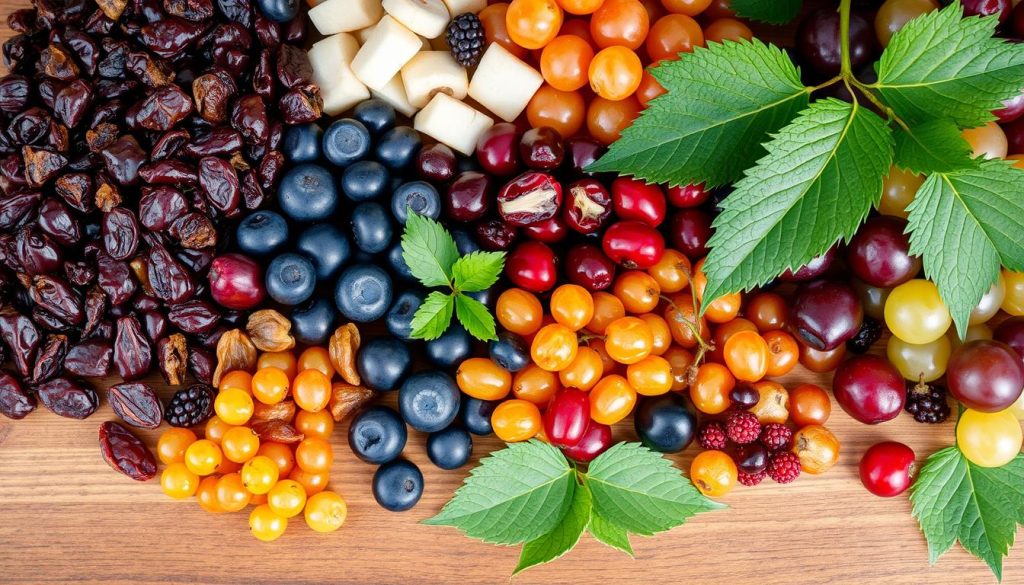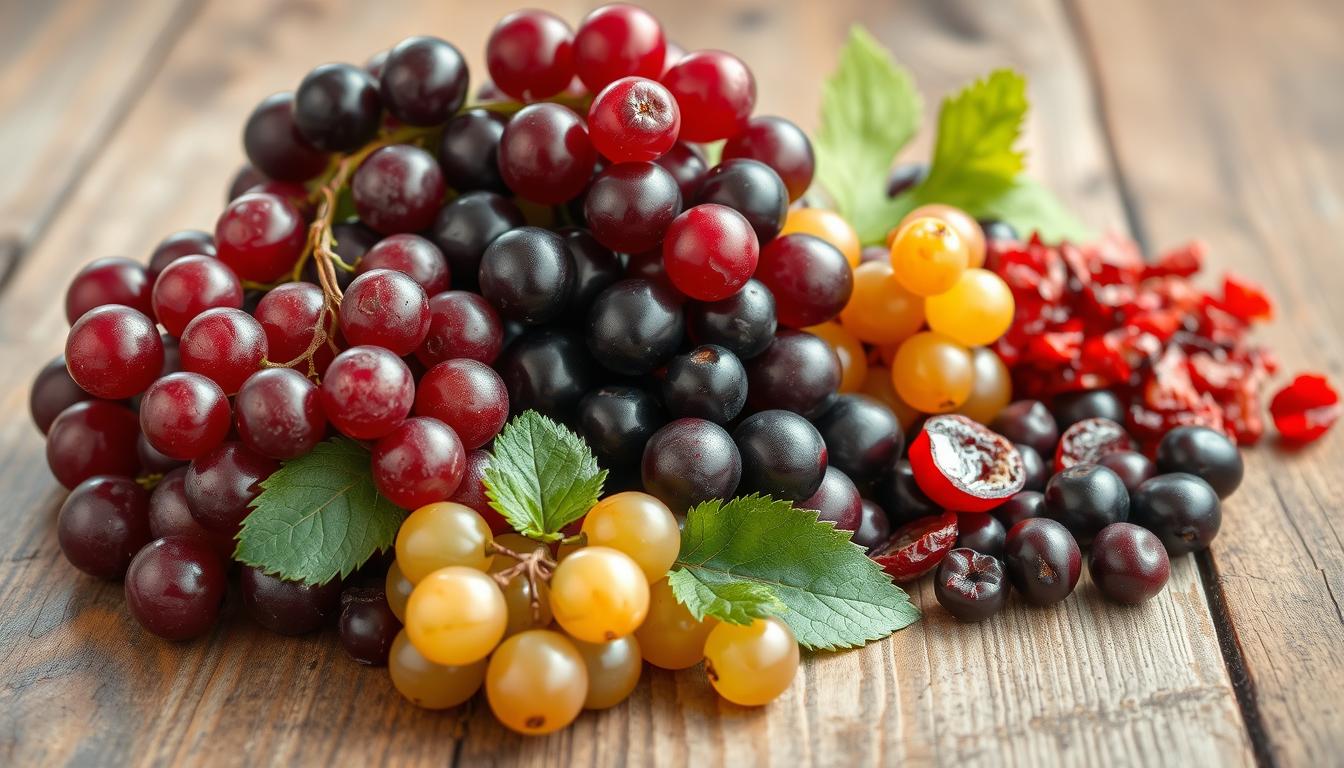Welcome to your guide on finding substitutes for currants. Whether you’re a pro chef or a home cook, needing currant alternatives is common. This guide will show you the best substitutes, their uses, textures, and flavors. This way, your dishes will stay true to their original taste.
Knowing when to use a substitute is key to smooth cooking. As you explore, you’ll find great alternatives to currants. These will make your cooking even better, keeping your recipes tasty and satisfying. Let’s explore the world of currants and their substitutes together.
Understanding Currants and Their Culinary Uses
Currants are small dried fruits from the Black Corinth grape, also known as Zante currants. They are different from raisins because of their size and sweet-tangy taste. You might ask what are currants? They are not the same as fresh currants, which are small berries from shrubs. Knowing about both types can make your cooking better.
What are Currants?
Currants come in two types: dried and fresh. Dried currants, mainly Zante currants, are used in many dishes. Fresh currants, with their bright colors and flavors, are great for adding natural gelling to recipes. They are perfect for jams, jellies, and desserts, showing how currants can improve both sweet and savory dishes.
Common Dishes Featuring Currants
Currants are used in many tasty dishes. Here are some examples:
- Breakfast muffins and quick breads
- Decadent desserts like tarts and ice creams
- Savory meat sauces and stuffing
- Fresh salads with a burst of flavor
- Jams and jellies, where their high acidity shines
These currants in recipes show how versatile they are. They are a great addition to your cooking.
Why You Might Need a Substitute for Currants
In cooking and baking, knowing why substitute currants is key. Currants have a special flavor but might not be easy to find. This leads to currant availability issues that can mess up your plans. Also, what you like to eat is important, so finding alternatives that taste good to you is a good idea.
Availability Issues in Stores
Finding fresh currants in stores can be hard. Even places that sell special foods might not have them all the time. This can be a problem when you need currants for a recipe. Having substitutes ready can save you time and make sure your dishes turn out well. Here’s a table with some good substitutes and what they’re like:
| Substitute | Flavor Profile | Best Uses |
|---|---|---|
| Raisins | Sweet, chewy | Cookies, granola |
| Dried Cherries | Tart, sweet | Baking, salads |
| Dried Cranberries | Tart, slightly sweet | Trail mix, baked goods |
| Dried Apricots | Sweet, tangy | Stuffings, pastries |
| Dried Blueberries | Sweet, slightly tangy | Pancakes, muffins |
| Dried Dates | Sweet, sticky | Energy bars, desserts |
Personal Taste Preferences
Your taste can make you choose substitutes. Maybe currants don’t taste right to you. Using things like dried apricots or cherries can make your dish better and match your taste. Each option brings a special flavor that can make your cooking better.

Substitute for Currants Guide
Looking for a substitute for dried currants? It’s key to know what to look for. The best substitute should have similar sweetness, tartness, and texture. This ensures your dishes turn out great.
Top Characteristics to Consider in Substitutes
When searching for a currant substitute, keep an eye out for these traits:
- Sweetness: The substitute should have a similar sweetness to currants.
- Tartness: A bit of tartness is good, just like currants.
- Size and Texture: The substitute should be about the same size and chewy.
Flavor and Texture Matching
For a dish to be satisfying, flavors and textures must match. Here are some good matches:
| Substitute | Flavor Profile | Texture |
|---|---|---|
| Raisins | Sweet, similar to currants | Chewy, comparable size |
| Dried Cranberries | Tart, bright red color | Firm, slightly similar |
| Dried Cherries | Sweet and tangy | Chewy, versatile |
| Dried Prunes | Deep sweetness | Dense, needs preparation |
| Dried Blueberries | Sweet but different | Soft, slightly chewy |
| Goji Berries | Earthy, less sweetness | Chewy, smaller size |
Think about these options and their unique tastes when making your recipes. Knowing what to look for in substitutes can make your cooking better. It keeps your dishes tasty and enjoyable.
List of Effective Substitutes for Currants
Looking for the best substitutes for currants can make your cooking better. Each option brings its own taste and texture. This lets you try new things and improve your dishes. Here are some great alternatives to currants.
Raisins: The Sweet Standby
Raisins are a top pick for currant substitutes. They’re similar in size and texture but sweeter. You can use raisins just like currants in most recipes.
Dried Cherries: A Tangy Alternative
Dried cherries add a fun twist to your food. They’re bigger and juicier than currants but have a tangy taste. Cutting them up and soaking them can make them easier to use as currant substitutes.
Dried Cranberries: Bright and Tart
Dried cranberries are bright and tart, great for both sweet and savory dishes. They’re a bit bigger than currants but work well in similar amounts. They add a unique flavor to baked goods and salads.
Dried Blueberries: Sweet with a Twist
Dried blueberries are sweeter and can enhance many recipes. You might need to adjust the sugar in your recipe because of their juiciness and sweetness.
Chopped Dates: Rich and Chewy
Chopped dates are sweet and chewy, making them a great choice. They’re versatile and can be used in many dishes, from scones to stews. They’re a good substitute for currants.
Dried Blackberries: Sweet and Mildly Tart
Dried blackberries are sweeter and similar in size and texture to currants. They’re perfect for baked goods, adding sweetness and a bit of tartness.
Prunes: Deep and Earthy Flavor
Prunes have a deep, earthy taste and less sugar than currants. They’re good for those watching their sugar intake. Prunes can be used in the same amount as currants in many recipes.

| Substitute | Flavor Profile | Texture | Recommended Use |
|---|---|---|---|
| Raisins | Sweet | Chewy | Baked goods, oatmeal |
| Dried Cherries | Tangy | Juicy | Chutneys, salads |
| Dried Cranberries | Tart | Chewy | Stuffings, desserts |
| Dried Blueberries | Sweet | Chewy | Granola, baked goods |
| Chopped Dates | Rich | Chewy | Scones, meat dishes |
| Dried Blackberries | Sweet | Chewy | Baked goods, snacks |
| Prunes | Earthy | Soft | Stews, desserts |
How to Use Substitutes in Your Recipes
Learning to use substitutes in cooking can make your meals better. It’s key to measure them right, like when swapping out currants. This keeps your dish tasting and feeling just right. Always start with a 1:1 ratio, unless the recipe says to do something different. Also, tweaking the sweetness and acidity is vital for the taste.
Measuring Substitutes for Optimal Results
Getting the right amount of substitutes is crucial. For example, raisins or dried cranberries can replace currants in a 1/2 cup amount. Dried cherries and blueberries work well too, but use only 1/4 cup each. To avoid overdoing it, measure carefully. Here’s a quick guide to help you:
| Substitute | Recommended Measurement |
|---|---|
| Raisins | 1/2 cup |
| Dried Cranberries | 1/2 cup |
| Dried Cherries | 1/4 cup |
| Dried Blueberries | 1/4 cup |
Adjusting Sweetness and Acidity
Adjusting your recipe might be needed, depending on the sweetness of your substitutes. For instance, if raisins are sweeter, you might cut down on sugar. It’s also important to balance the acidity. If your substitute is tart, add a bit more sugar or lessen acidic parts. The nutritional values of these substitutes can change your recipe’s overall health:
- Total Calories: 638 kcal
- Carbohydrates: 160 g
- Protein: 5 g
- Fat: 2 g
- Saturated Fat: 0.2 g
- Fiber: 16 g
- Sugar: 81 g
Tips for Experimenting with Substitutes
Trying out substitutes can make cooking more fun and creative. It lets you add new twists to old recipes. Here are some tips to help you get creative.
Flavor Pairing Ideas
Pairing flavors right can make your dish even better. Here are some great combinations to try:
- Dried Cherries with citrus zest adds a bright, fresh flavor.
- Dried Cranberries and nuts create a satisfying contrast in salads.
- Raisins and warm spices enhance the sweetness in baked goods.
- Dried Figs with cheese brings out rich flavors in savory dishes.
Creative Uses in Savory Dishes
Being creative with substitutes can add exciting touches to your meals. Here are some ideas:
- Mix dried fruits into grain salads for added texture and sweetness.
- Incorporate chopped dates into meat dishes for a touch of sweetness.
- Create unique flavor profiles in scones by adding a combination of fruits and spices.
- Use raisins or dried apricots in tagines for an unexpected sweetness.
Conclusion
Learning about substitutes for currants can make your cooking more flexible. It keeps your dishes tasty and fun. You can use dried cranberries, raisins, or black currants as good alternatives.
When picking a substitute, think about the flavor and any needed changes in your recipe. Jam recipes, for example, can work well with different fruits because of their acidity. But, always follow safety rules, like adding more acid when needed.
Don’t be afraid to try new things in the kitchen. Using the right substitutes for currants can add variety to your meals. It keeps the spirit of your favorite dishes alive. Remember, being creative in cooking can lead to amazing flavors and new discoveries!
Source Links
- https://cookscrafter.com/currant-substitutes/
- https://bakeitwithlove.com/currants-substitute/
- https://www.thespruceeats.com/what-are-currants-2215835
- https://foodprint.org/real-food/currants/
- https://askthefoodgeek.com/currants/
- https://www.alsothecrumbsplease.com/currant-substitute/
- https://gustomeadow.com/dried-currant-substitutes/
- https://yumeating.com/substitute-for-dried-currants/
- https://goodgoodbrand.com/blogs/articles/red-currant-jelly-alternative
- https://lowhistamineeats.com/currant-substitute/
- https://www.thekitchn.com/whats-the-difference-between-raisins-sultanas-and-currants-223285
- https://kouroshfoods.com/articles/currants-vs-raisins-vs-sultanas/
- https://divascancook.com/ultimateingredient-substitution-guide/
- https://girlmeetsfood.com/substitute-for-currant/
- https://ask2.extension.org/kb/faq.php?id=571707
- https://saltedplains.com/cranberry-substitutes/
